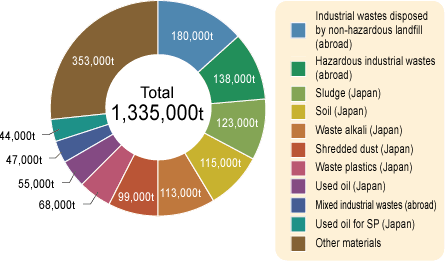Total Energy Input
The DOWA group uses purchased power, in-house power generation, fossil fuels and steam as energy sources. Total amount of energy input for 2011 was 15.8 PJ (peta (=1015 joule). The DOWA group will further promote energy saving to fight against global warming and will strive to convert our energy sources to those producing less CO2 emissions by introducing solar power and hydraulic power generation on an increased basis.
In 2011 the amount of thermal power generated was 1 GWh, solar 277 MWh and hydraulic 63.3GWh. We also purchased steam of 756 GJ (purchased base) derived from wood biomass from outside sources.
Measures for Reduction
![]() Effective utilization of heat sources within our operating companies
Effective utilization of heat sources within our operating companies
![]() Energy saving through improvement of facilities and equipment
Energy saving through improvement of facilities and equipment
For the utilization status of heat generated within the DOWA group, see "Recycling Status of Resources".
Indirect energy
Reduction of energy consumption and improvement of energy efficiency are absolutely necessary to reduce CO2 emission. The DOWA group is promoting such reduction and improvement through: utilization of renewable energy including hydro and solar power; switching to and introduction of energy saving equipment and facilities; and a modal shift of logistics.
Purchased Power
Purchased power in 2011 amounted to 1m137 GWh (1,115 GWh in Japan and 22 GWh abroad) and the purchased power in Japan increased by 2% compared to the previous year. This was mainly due to the recovery of operations at Akita Zinc.
< Changes of Annual Purchased Power >
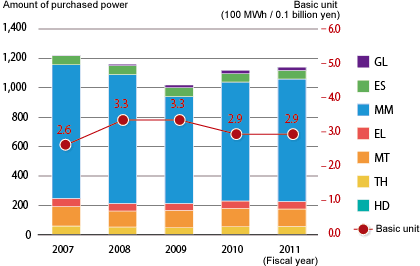
Fossil Fuel Consumption
The amount of fossil fuel consumption in 2011 was 116,000 kL as converted to crude oil (112,000 kL in Japan and 4,000 kL abroad), an increase of 4% in Japan compared to the previous year. This was mainly because the new furnace to incinerate minor PCB wastes started operation in ECO-SYSTEM Sanyo and usage of kerosene and used oil increased.
Energy consumption for transportation in 2011 was 218 TJ (110 TJ in Japan and 108 TJ abroad).
< Changes of Annual Fossil Fuel Consumption >
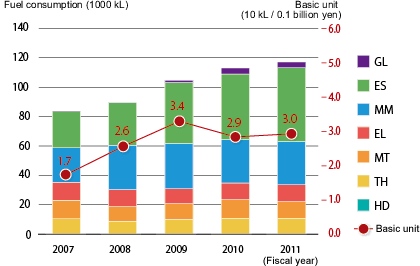
Water Resource Input
Water resource input in 2010 consisted of purchased water of 5.1 million m3 (4.6 million m3 in Japan and 0.5 million m3 abroad) and in-house intake of water of 97.2 million m3 (97.2 million m3 in Japan, 0.1 million m3 or less abroad), totaling 102 million m3, an increase of 25% in Japan compared to the previous year. This was mainly due to the recovery of operations at Akita Zinc.
In 2011 in some of our operating companies, usage of ground water increased in summer due to depletion of water, and usage of water to melt snow and ice increased due to the heavy snowfall. We recognize the impact of climate changes on our usage of water resources and will endeavor for proper use and management of water resources.
Measures for Reduction
![]() Energy saving measures for driving force of pumps and reduction of intake of sea water
Energy saving measures for driving force of pumps and reduction of intake of sea water
![]() Reduction of usage of river water through improvement of routes of cooling water
Reduction of usage of river water through improvement of routes of cooling water
< Changes of Annual Water Resource Input >
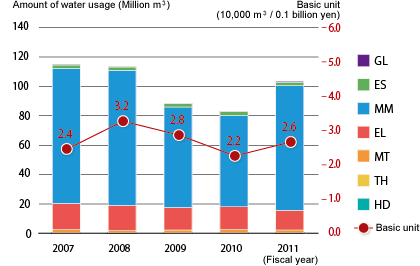
Total Material Input
The DOWA group uses materials, remedial agents, machine parts and packaging materials in its production and processing businesses as raw materials and accepts wastes disposed from other companies and local government agencies in the industrial waste disposal business.
Total amount of material input consisting of raw materials and accepted wastes in 2011 was 2,211,000 tons.
Measures for Reduction
![]() Yield increase through quality improvement
Yield increase through quality improvement
![]() Recycling of wastes from processes as raw materials
Recycling of wastes from processes as raw materials
![]() Expansion of the life cycle of processing trays by implementing automatic cleaning machines
Expansion of the life cycle of processing trays by implementing automatic cleaning machines
< Changes of Annual Consumption of Raw Materials >
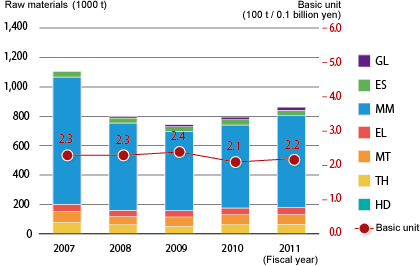
Raw materials usage (Virgin material and recycled material)
 The DOWA group used 850,000 tons of raw materials (831,000 t in Japan and 19,000 abroad) in 2010. Raw materials used in Japan increased by 8%, compared to the previous year. Usage of virgin materials in Japan was 682,000 tons, while that of recycled materials was 149,000 tons and commissioned products for heat treatment were 59,000 tons. Usage of raw materials (ores) increased in Akita Zinc and DOWA IP Creation compared to the previous year. Commissioned products for heat treatment also increased in Handa Plant of DOWA Thermo Engineering, etc.
The DOWA group used 850,000 tons of raw materials (831,000 t in Japan and 19,000 abroad) in 2010. Raw materials used in Japan increased by 8%, compared to the previous year. Usage of virgin materials in Japan was 682,000 tons, while that of recycled materials was 149,000 tons and commissioned products for heat treatment were 59,000 tons. Usage of raw materials (ores) increased in Akita Zinc and DOWA IP Creation compared to the previous year. Commissioned products for heat treatment also increased in Handa Plant of DOWA Thermo Engineering, etc.
< Details of Raw Materials Usage >
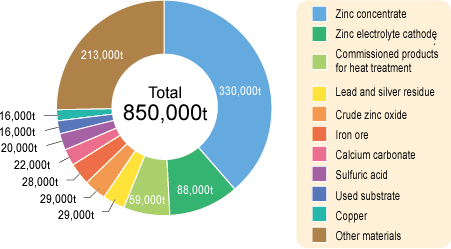
Accepted Wastes
Accepted wastes in 2011 were 1,361,000 tons (939,000 t in Japan and 424,000 t abroad). Of accepted wastes in Japan, polluted sludge (not requiring special controls) increased by 12%, while alkali and soil decreased by 5% and 27% respectively. Total accepted wastes in Japan decreased 9% compared to the previous year. The DOWA group is also engaged in disposal of CFC and CFC substitutes from used home electric appliances and used automobiles. CFC and CFC substitutes are one of the causes of destruction of the Ozone Layer and global warming. In 2011 we recovered and destructed 72 tons of CFC and equivalents in Japan and abroad. This corresponds to 198,000 tons when converted to CO2.
*In our environmental management & recycling business (overseas) corrections were made in the amount of wastes that occurred in previous years.
*Explosive, toxic and infectious industrial wastes and others that may cause danger to human health and living environment are designated as industrial wastes requiring special controls according to the Waste Disposal Law and are required to be disposed according to stricter standards than those for other industrial wastes.
SP = abbreviation for industrial wastes requiring special controls
< Changes of Annual Accepted Wastes >
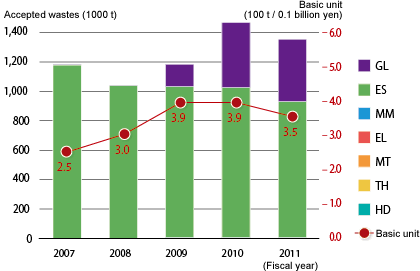
< Details of Accepted Wastes >
